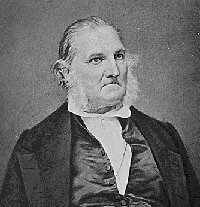|
Champions
of Conservation
While the environment lacks often lacks a voice in current
society, there have been a few individuals that have
distinguished themselves by studying and speaking for the
environment. The environment and the conservation movement has
often found itself at odds with traditional government and
industry. Both the government and industry have a long history
of using our natural resources for economic gain while
ignoring the needs of plants and animals that rely on those
same resources or are harmed by reckless human development.
Speaking for the environment can be a difficult task as Rachel
Carson discovered when her scientific reputation was
openly challenged by the pesticide industry following the
publication of Silent Spring.
Through this section we profile some of the Champions of
Conservation who have researched, spoken for, or acted on
behalf of the environment.
(read more ...)
|

John James Audubon sparked a public
interest in understanding, and protecting wildlife.
Today his paintings, and the organization that bears his name
provide a lasting legacy.
|
|
Environmental
Events
While change is often slow and gradual, there are
occasionally individual events that are distinctive in their
impact on society, the environment and history. Environmental events can be both positive - as is Earth
Day and its ethic of teaching environmental stewardship -
and negative - as was the experiment that caused the Chernobyl
nuclear reactor to melt down. Some events are actually
the culmination of long term trends or efforts like the
passing of the endangered species act in 1972, while others
instantaneously and unexpectedly change the course of history
as did the crash of the Exxon
Valdez.
(read more ...)
|

During the 1960s and 1970s
many people believed the environment and the planet were being
killed. Earth day began a serious dialogue about the
impacts of human activities on our planet.
|
|
People and
their Environment
The impact people and human actions have on the natural
environment is impressive by almost any measure. Through
hunting and harvests many species have been pushed to the
brink of extinction while others have taken advantage of our
activities and expanded their ranges. Here we examine the
impacts of humans on the natural environment and examine some
ways to reduce our "environmental footprint."
(read more ...)
|

By turning rivers into
ditches, and eliminating riparian vegetation we've lost critical
parts of our ecosystem.
|
|
Environmental
Education
Considering this site is focused on educating people about
the environment something would be left out if we didn't touch
on a few of the other ways you can learn more about the
environment. Books, classes and lectures are all excellent
ways to learn more about the environment - both where you live
and around the world. Protecting and restoring the environment
that surrounds us is a job for all of us.
(read more ...)
|

Recreation is a great way to learn more
about the environment.
|
|
Environmental Careers
Protecting the environment has become big business - its
not just for underpaid non-profit organizations anymore!
Demand for talented individuals in environmental fields has
continued to grow as today there is a focus on using
technology to help streamline things like environmental
assessments, monitoring and permitting. Of course there is
still a need people in traditional environmental fields like
wildlife management, landscape architecture, and forestry.
Geographic
information systems (GIS) and geographic positioning systems
(GPS) are current buzzwords in environmental fields, but these
are just tools for people trained in basic natural history and
environmental education. Here we explore the outlooks and
prospects for people seeking environmentally oriented careers.
(read more ...)
|

This forester is placing a
barrier tree to let logging crews know this area is off-limits
because of nesting birds.
|

